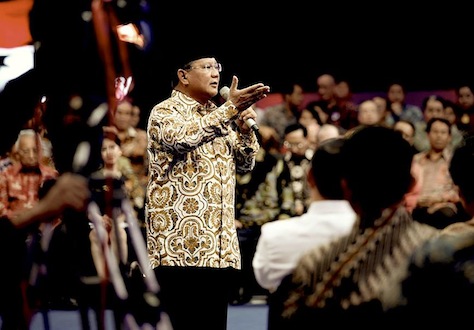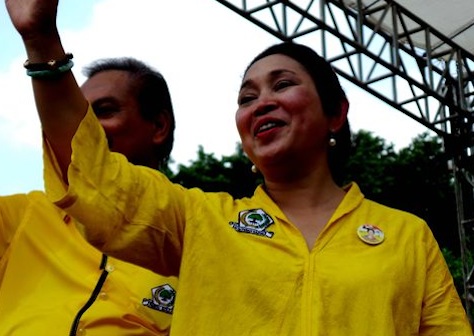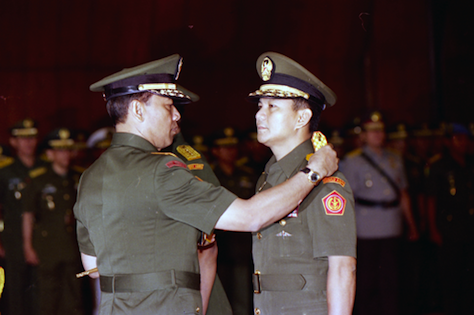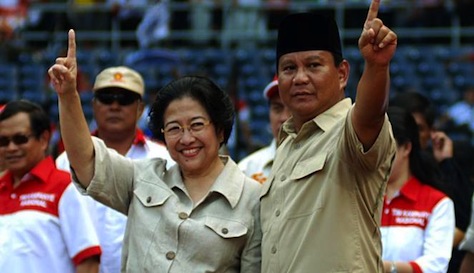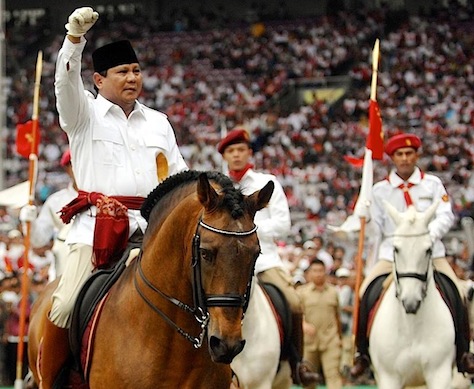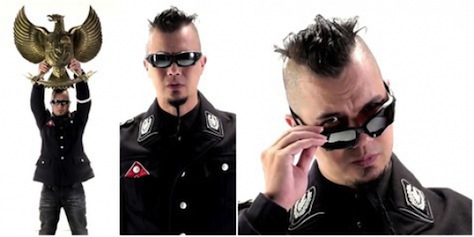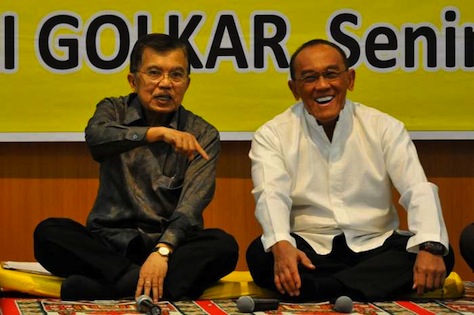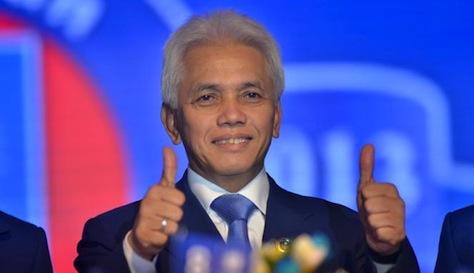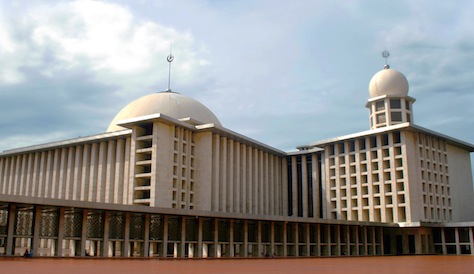Joko Widodo has the opposite problem of US president Barack Obama, whose more unhinged opponents claim that Obama, who spent four years of his childhood in Indonesia, is secretly a Muslim.![]()
In Indonesia’s presidential race, it’s the young Jakarta governor who has to assure voters he’s a Muslim and not, as the dirty-trick accusations suggest, a secret Christian.
With the campaign to elect Indonesia’s next president in full gear, everyone assumed that the political phenomenon that is Widodo (know universally in Indonesia as ‘Jokowi’) would easily win on July 9.
Though the race was invariably set to tighten, it’s now a toss-up — and Prabowo Subianto (pictured above), a Suharto-era ‘military strongman,’ may yet manage to steal an election that’s long been considered Jokowi’s to lose.
* * * * *
RELATED: In Indonesia, it’s Jokowi-Kalla against Prabowo-Hatta
* * * * *
Jokowi’s meteoric rise began with his surprise election as Jakarta’s governor in September 2012. Since then, he’s accomplished an astonishing amount of policy reforms, including the implementation of a universal health care program for Jakarta.
Going into the April parliamentary elections, the Indonesian Democratic Party of Struggle (PDI-P, Partai Demokrasi Indonesia Perjuangan) named Jokowi as its presidential candidate, ending months of speculation with an announcement designed to maximize excitement over Jokowi’s presumed candidacy — and also foreclosing the possibility that former president Megawati Sukarnoputri would make a third consecutive run.
Though the PDI-P won the April elections, it didn’t do nearly as well as polls indicated, garnering just 18.95% of the vote, narrowly leading Golkar (Partai Golongan Karya, Party of the Functional Groups), the vaguely liberal party founded by Indonesia’s late 20th century strongman, Suharto. Golkar continues play a strong role in Indonesian politics today, most recently as the junior partner in the government led by Susilo Bambang Yudhoyono (‘SBY’) since 2004.
* * * * *
RELATED: ‘Jokowi’ effect falls flat for PDI-P in Indonesia election results
* * * * *
Yudhoyono is term-limited after winning the 2004 and 2009 presidential elections in landslide victories, though he’ll leave office with somewhat mixed ratings. His own party, the Partai Demokrat (Democratic Party) won just 10.2% in the April legislative elections, falling to fourth place overall.
Golkar, in turn, only narrowly outpaced Prabowo’s party, the nationalist Gerindra (Partai Gerakan Indonesia Raya, the Great Indonesia Movement Party), which he formed in 2008 when he left Golkar, hoping to use a new party vehicle to power his own 2009 presidential run.
For much of 2013, earlier this year, and even after the parliamentary elections, Jokowi led every poll survey in advance of the July 9 election. But Prabowo, age 62, has hammered against Jokowi, age 53, for his relative inexperience, chipping away at what’s perhaps Jokowi’s chief strength — his novelty, reformist instincts, and the lack of any trace of corruption.
Prabowo is neither novel nor reformist nor corruption-free.
He’s a battle-toughened veteran of Indonesian politics, who has shifted from one alliance to another over the past decade.
Some critics argue that he’s essentially ‘Suharto 2.0’ — or worse.
Most publicly available polls from May and early June still show Jokowi with a lead, sometimes even with a double-digit lead. But there’s a sense that, as the parties engaged in post-April elections over alliances and running mates, and as Prabowo and Jokowi have engaged on the campaign trail and in three of five scheduled presidential debates, the race is tightening — and the momentum is with Prabowo. Dirty tricks, including rumors that Jokowi is Christian and that Jokowi is Chinese, have marked the campaign in its final weeks.
it’s hard to know exactly where the candidates stand because polling is still unreliable in Indonesia and, moreover, there’s been a lack of recent polls from more reliable pollsters. But a poll taken between June 1 and 10 by the DC-based International Foundation for Electoral Systems and the Indonesian Survey Institute found 42% of Indonesian voters support Jokowi and 39% support Prabowo, with 19% undecided. Other pollsters are rumored to have withheld polling that shows Jokowi’s lead sharply narrowing or, in some cases, a Prabowo lead.
In opposition since leaving Golkar six years ago, Prabowo has powered Gerindra into a force in Indonesia with a platform of populist rhetoric high on economic nationalism in a country with particular anxiety about global markets since the 1997-98 Asian currency crisis that caused a 13% contraction in the Indonesian economy in 1998, precipitating Suharto’s downfall after three decades in power.
So who is Prabowo? And how would he govern Indonesia differently than Jokowi?
Prabowo ranks among Indonesia’s wealthy elite.
Born to a wealthy family just six years after Indonesia won its independence from The Netherlands, Prabowo comes from a long line of Javanese that claim to trace their roots to royalty from the pre-colonial era. His grandfather founded what is today one of Indonesia’s largest Banks, Bank Negara Indonesia, and today, Prabowo is one of Indonesia’s wealthiest politicians, with interests in many of the country’s leading industries. Hashim Djojohadikusumo, his younger brother, is a London-based tycoon with one of Indonesia’s largest fortunes.
Prabowo and his family have very strong ties to Suharto.
When Prabowo was just seven years old, his father, economist and one-time finance minister Sumitro Djojohadikusumo, was actually exiled from the country by the left-leaning Sukarno, Indonesia’s first post-independence president. The family spent the better part of a decade relocating through Hong Kong, Kuala Lumpur, Zurich and elsewhere.
When Suharto took power in 1967 after a turbulent year of political violence, Sumitro returned after nearly a decade abroad. For the next decade, he served in Suharto’s cabinet, first as trade minister, then as research minister.
Between 1983 and 2001, Prabowo was married to Suharto’s daughter, Siti Hediati Hariyadi (pictured above), known within Indonesia as ‘Titiek,’ and who herself won a seat to the Indonesian legislature in April on the Golkar ticket. They have one son together, Didit Hediprasetyo, who is now a Paris-based designer. Throughout the campaign, there’s been some enthusiasm among supporters to see Prabowo and Titiek reconcile.
Prabowo also has a controversial military past.
Prabowo commanded Indonesia’s fearsome special forces, the Kopassus. Like many top military leaders in the Suharto era, Prabowo’s reputation is somewhat sullied by the campaign to subdue East Timor, and he’s been accused of human rights abuses when he served in East Timor in the 1980s.
But the most substantial charge against Prabowo stems from 1998, in the final months of the Suharto era, when he was accused of ordering the kidnapping and torture of 23 pro-democracy activists. The accusations were enough to compel the end of Prabowo’s military career, leaving him a political pariah in the early days of Indonesia’s transition to democracy.
Prabowo has denied all the specific charges against him, but he’s also defiantly added that he acted, as a military commander, in the best interests of his country. A national human rights commission recommended in 2006 that Prabowo be indicted for the kidnappings, though Indonesia’s reticent attorney general’s office didn’t pursue charges. As Prabowo’s presidential chances rise, the level of scrutiny on his military career is also rising.
Atrocities in East Timor have stymied the political ambitions of another former general, Wiranto, whose own military record in 1998 is tarnished with human rights abuse, and who was Prabowo’s superior in the final days of the Suharto era. Wiranto, too, went into represented Golkar in the 2004 presidential election, the first direct vote in Indonesian history, placing third behind eventual winner Yudhoyono and runner-up Megawati.
Wiranto, who like Prabowo, left Golkar to form his own party, Hanura (Partai Hati Nurani Rakyat, The People’s Conscience Party), supports Jokowi in 2014 after Hanura won just 5.26% in the April legislative elections.
Wiranto (pictured above, left, dismissing Prabowo in 1998) is now leading the charge against Prabowo, confirming last week that Prabowo was indeed discharged from the military over the 1998 accusations, though his support for Jokowi and his own troubling past undermines his credibility to level charges against Prabowo.
The United States has banned Prabowo from entering the country.
Like Narenda Modi, who was in April elected as India’s prime minister, Prabowo has been barred from entering the United States, most recently in 2000 when he was denied a visa to travel to Boston to attend his son’s university graduation, largely due to the lengthy list of allegations against Prabowo for torture and human rights abuses.
If Prabowo wins the election, the US state department will likely permit his entry to the United States as a head of state. As with Modi, it will involve some amount of awkward diplomacy. Throughout the campaign, Prabowo has railed against the United States, among other Western countries, for looting Indonesia’s wealth.
Ironically, Prabowo trained with the US military at Fort Benning in 1985 and, despite his recent fulminations against US imperialists sabotaging the Indonesian economy, Prabowo has lauded the United States in the past. The United States strongly supported the Suharto regime, especially at the height of the Cold War.
Prabowo rose to prominence most recently with populist, economic nationalist rhetoric.
As Gerinda’s leader, Prabowo carved out a role as the most protectionist voice in Indonesian politics. Though has tried to reassure investors that he’ll pursue market-friendly policies, his rhetoric on the campaign trail indicates otherwise. In conspiratorial tones, Prabowo denounces foreigners (many of whom, ironically, do business with his family’s interests) for draining Indonesia’s wealth. He’s argued for renegotiating trade deals, and he’s also argued for restricting certain foreign investment within Indonesia.
His nationalism isn’t just economic, either. In a recent foreign policy debate, Prabowo blamed poor relations with Australia on Australians:
‘Honestly, I think that the problem is not in Indonesia. Perhaps Australia holds some kind of suspicion towards Indonesia. A kind of phobia,’ Prabowo said.
Though Golkar and Yudhoyono’s outgoing Democrat-led government are relatively much more favorably inclined to liberal economic policy, the politics of protectionism remain incredibly strong in Indonesia. Despite relatively robust GDP growth of 5% to 6% over the past decade, Indonesia isn’t especially integrated into the regional economy. While Yudhoyono has presided over an economy that’s been largely welcoming of foreign investment, Jokowi’s supporters believe that he might take even stronger steps as president, cracking down on corruption and possibly even joining negotiations for the Trans Pacific Partnership.
Prabowo’s rhetoric was a main catalyst for the current government’s decision to introduce a ban on the export of raw mineral ores and to enact a new mining tax. Prabowo’s rhetoric has been so effective that even Jokowi has started to sound more populist, though global investors won’t be nearly as spooked if Jokowi, with a strong (and squeaky-clean) record on delivering policy results in Jakarta, wins.
Prabowo was on Megawati’s team five years ago.
After leaving Golkar in order to run for the Indonesian presidency in 2009, Prabowo found himself without enough support to wage a credible presidential campaign under Gerindra’s banner. Accordingly, he settled for joining Megawati’s ticket as her running mate. It was a stunning, if not entirely credible, partnership given that Megawati is the daughter of Sukarno and Prabowo is the former son-in-law of Suharto. Together, the Megawati-Prabowo ‘MegaPro’ ticket won just 26.79% of the vote, far behind Yudhoyono, who won the election outright with 60.80%.
Megawati (pictured above in 2009), still a key behind-the-scenes player in the PDI-P and Jokowi’s presidential campaign, is now very much on opposite sides.
Most recently, Jokowi chose Basuki Tjahaja Purnama, another Gerindra official, as his running mate in the 2012 Jakarta gubernatorial election. Since June 2, Basuki has served as the acting governor of Jakarta during Jokowi’s presidential bid, and he could wind up as the permanent governor if Jokowi becomes president.
Prabowo might not be such an enthusiast for democracy.
Though Prabowo claims that he won’t dismantle Indonesia’s nascent democracy, there’s a distinctly authoritarian vibe in the way that he promises on the campaign trail to bring ‘strong’ and ‘decisive’ leadership if elected president. He kicked off his campaign on horseback (pictured above) in a ‘military-style’ rally at one of Jakarta’s largest stadiums.
Prabowo has expressed a passing interest in restoring the country’s 1945 constitution, which guided the authoritarian regimes of both Sukarno and Suharto. In the Suharto era, political expression and press freedom were highly restricted, and Prabowo is often accused of having executed internal repression in the service of Suharto, including fomenting anti-Chinese riots in 1998. Even if he says he respects democracy and the rule of law today, critics fear he could revert to Suharto-era views on freedom and human rights. It doesn’t help that Prabowo has pledged, if elected, to elevate Suharto as an official ‘national hero.’
Though Prabowo has tried to stress that he won’t take Indonesia backwards, his protestations, such as to The New York Times in March of this year, don’t seem incredibly heartfelt:
“I’ve never been indicted for anything; it’s always innuendos, always allegations,” he said, speaking fluent English in the recent interview. “My critics always say I am a threat to democracy, blah, blah, blah. I believe in democracy and in human rights.”
Other Gerindra leaders paint a more ambivalent vision of how he would govern:
“People want a strong leader. They believe Indonesia will have a better foreign policy under Prabowo,” Gerindra’s party chief, Suhardi, told DW. “Indonesia was pleasant and calm under Suharto. People need a strong and stable government, which can boost the country’s economy.”
Activist Allan Nairn earlier this week published parts of an interview he conducted in 2001 with Prabowo, in which the current presidential candidate disparaged the country’s new civilian leaders:
“Indonesia is not ready for democracy,” Prabowo said. “We still have cannibals, there are violent mobs.” Indonesia needs, Prabowo said, “a benign authoritarian regime.” He said the many ethnicities and religions precluded democracy….
Prabowo called for a different model. He mentioned Pakistan’s General Pervez Musharraf. Musharraf had arrested his country’s civilian prime minister and imposed dictatorship. Prabowo said he admired him greatly. Prabowo ruminated on whether he could measure up, whether he could be an Indonesian Musharraf.
“Do I have the guts,” Prabowo asked, “am I ready to be called a fascist dictator?”
Yes, they’re comments from 13 years ago, and yes, Indonesia’s democracy is much more firmly rooted today than in 2001, but Prabowo’s comments are chilling enough.
Prabowo’s supporters wield far more control over Indonesia’s television media.
One of the most spectacular advantages for the Prabowo camp is the way that its supporters control much of Indonesia’s television media, including through the support of Golkar party leader Aburizal Bakrie media tycoon Hary Tanoesoedibjo, another Prabowo supporter. Their two national television channels control nearly 40% of the market share. That’s a significant benefit, and it’s largely stunted the ‘rock-star’ like status that Jokowi enjoyed before the presidential campaign began. It could also bode poorly for press freedom if Prabowo wins the election.
The media muscle is not always to Prabowo’s benefit. A video created this week, starring celebrity musician Ahmad Dhani (pictured above), a Prabowo supporter, dressed up in what closely resembles Nazi-era clothing, has drawn considerable global derision, and could backfire as voters focus on the last two weeks of the campaign.
Though Golkar’s voter base is split in the 2014 election, Prabowo has the support of the Golkar party machine.
Golkar’s current leader, wealthy businessman Aburizal Bakrie, has tried to rally his party behind Prabowo. In theory, the support of Bakrie and other top Golkar officials gives Prabowo access to the machinery of one of the two most established pancasila parties in Indonesia, the other being the PDI-P of Jokowi and Megawati.
But it’s not as simple as that, because Jokowi has chosen as his running mate Jusuf Kalla (pictured above, left, with Bakrie, right), a former Golkar leader himself who served between 2004 and 2009 as vice president, often using Golkar’s parliamentary strength to drive domestic policy with more deftness than Yudhoyono. (To demonstrate the ‘strange bedfellows’ nature of Indonesian politics, consider this: after aligning with the Democrats and Yudhoyono successfully in 2004, Kalla broke with Yudhoyono in 2009 to run for president on a ticket with Wiranto, and he’s now broken with the Golkar leadership to join a ticket alongside Jokowi and former rival Megawati’s PDI-P.)
Moreover’s Bakrie’s decision to support Prabowo was controversial, due to Prabowo’s strident economic nationalism, and many commentators believed that Golkar would support the more reformist, anti-corruption Jokowi, especially as it became clear that Kalla would join Jokowi as his running mate. In particular, Kalla is expected to boost Jokowi, a native Javanese, in his own home base of Sulawesi.
Prabowo’s running mate is the surprisingly liberal economics minister in the outgoing Yudhoyono administration.
In choosing Hatta Rajasa (pictured above) as his running mate, the leader of one of Indonesia’s mildly Islamist parties, Prabowo has pulled one of the most high-profile economic policymakers of the Yudhoyono administration.
Hatta, a rising star of Indonesian politics, began the Yudhoyono era as transportation minister from 2004 to 2007, was promoted to state secretary from 2007 to 2009 and, until his vice presidential nomination in May, served as Indonesia’s coordinating minister for economics in Yudhoyono’s second term.
Though neither Yudhoyono nor the Democrats, unpopular after a mixed record over 10 years in office, have endorsed either candidate, Hatta’s daughter is married to Yudhoyono’s youngest son, lending some credibility to the view that Yudhoyono informally supports Prabowo, like Yudhoyono a former Suharto-era military leader. Critics argue that, to the extent Yudhoyono successfully consolidated a democratic and investment-grade Indonesia, Jokowi represents his most natural successor.
Prabowo built a coalition that hopes to pick up the bulk of the Islamist parties’ supporters.
Jokowi initially won the support of the strongest of Indonesia’s four Islamist parties, the Partai Kebangkitan Bangsa (PKB, National Awakening Party), which has ties to Nahdlatul Ulama (NU), the longstanding Sunni civil society group. But Prabowo has won the support of the three remaining Islamist parties, and it’s his campaign supporters that are now spreading the word of Jokowi’s supposed Christian faith. Hatta, Prabowo’s running mate, is the leader of the Partai Amanat Nasional (PAN, National Mandate Party), making Hatta the only Islamist on either presidential ticket.
All four Islamist parties, along with Golkar, formed the backbone of Yudhoyono’s governing coalition for the past decade, and the four Islamist parties, in aggregate, won just under 30% of the vote in the recent April legislative elections.
Nearly 88% of Indonesia’s population is Muslim and, with 248 million people, that makes Indonesia the world’s most populous Muslim country. Further emphasizing the role of religion in the campaign, the annual period of fasting during the month of Ramadan begins on June 28, and will last through the final days of the campaign and election day.
